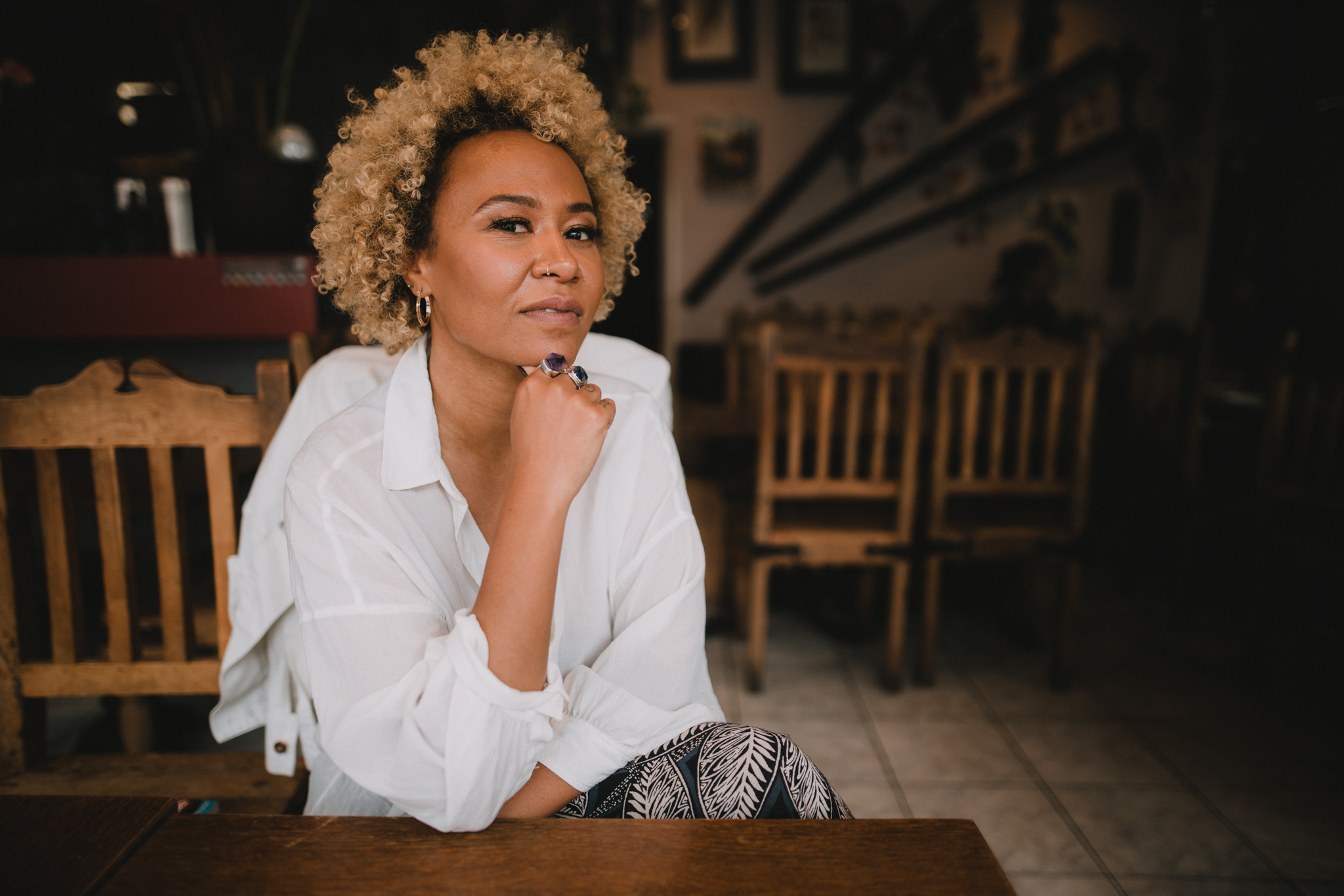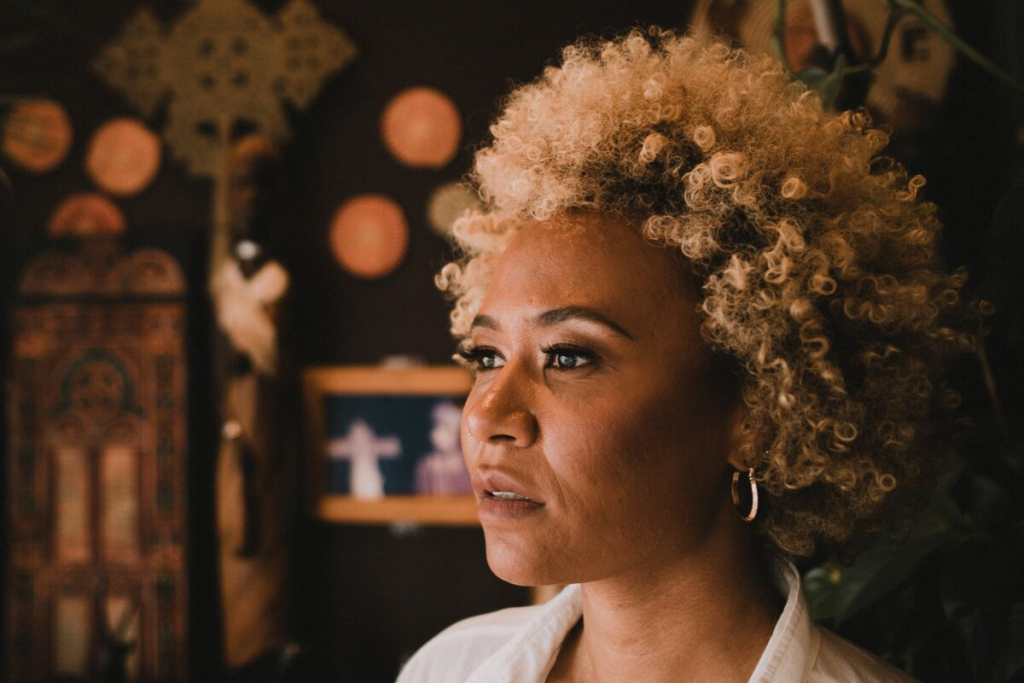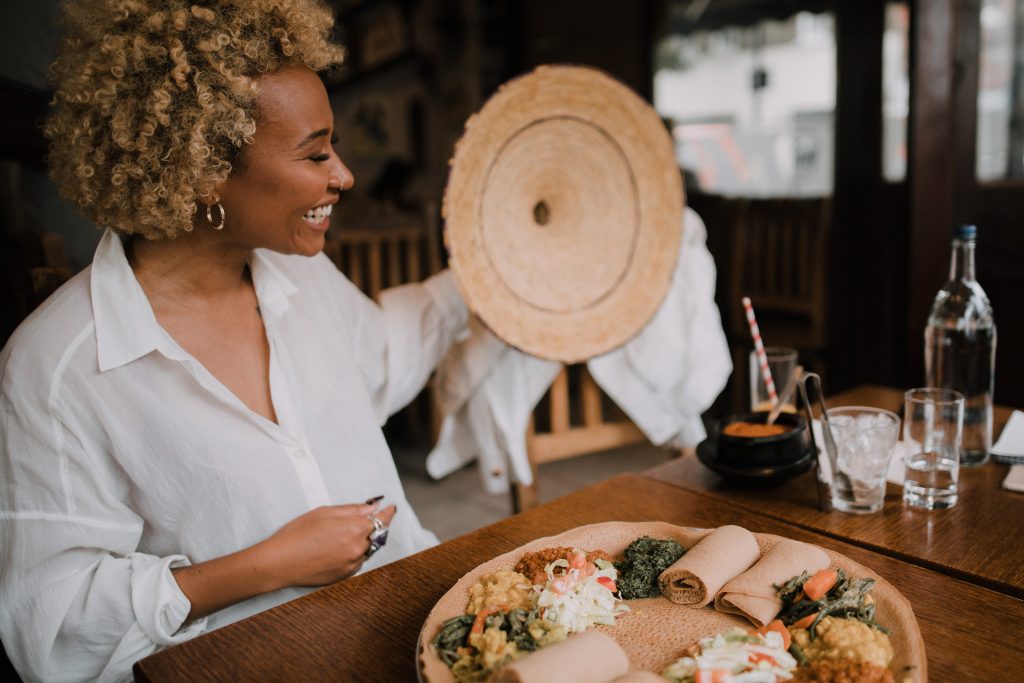
The first time I met Emeli Sandé was on a wild night out. Age 19 and at the only hip-hop club night in Edinburgh, my friends and I were dancing when a group of men led us off the dancefloor and into a VIP area, where Emeli was socialising. As it turned out, one of those men was Emeli’s husband. We spent the night shimmying and doing shots and I remember wondering how she was going to get on stage the next day. It was a late one. But when, on the band’s invitation, we attended her concert, her voice soared across one of Edinburgh’s most opulent venues. “If someone can sing like that on a hangover,” I thought, “I have no choice but to stan”.
On this, our second meeting then, I feel obligated to bring up our first. “That was fun! I remember that night,” Emeli says. We’re sitting in a small, Ethiopian restaurant in Camden called The Queen of Sheba, settling down to eat a vast platter of injera with accompanying stews and sauces and talk about Emeli’s new album, Real Life. After a complimentary glass of Ethiopian honey wine, we settle straight in.
This album comes three years after her last outing, Long Live the Angels and seven years after her debut album catapulted the 32-year-old singer to fame. “This time it was really different. Like I built a studio in my house,” she says. “I finally had the freedom of ‘a room of one’s own’.”
She worked closely with producer-percussionist Troy Miller, who works out of a studio in a shed in his back garden. “I loved the whole process of working with him because I felt really respected,” she says. Instead of cutting up the tracks and recording parts separately, Troy challenged her to perform each song in full. “He’d say, ‘You’re going to say things differently and emote different things if you treat it as if you’re telling a story from start to end.’ Everything on the album is done like that, studio full takes.”
It’s paid off. Led, of course, by her rich, vibrato-flush vocals, the album is uplifting, empowering and personal pop music – Emeli had a hand in writing every single track. There are hints of the creativity of Fela Kuti and the beats of Bob Marley. ‘Love to Help’ speaks of her urge to support those around her (“I want to be of service to people in some way”) and is blessed by sweet doo-wop-esque backing vocals, while ‘Sparrow’, the album’s lead track, begins with the urgent tinkle of a piano and surges into a fully-realised choir-backed ballad. “Everything was done in love,” Emeli says, earnestly. “The guys I worked with really became my friends and we had a summer at my house and a baby was born, everything was right.”
But the one thing she struggles with when it comes to an album release? Self-promotion. “It’s really cringey, but you’re kind of forced to a little bit in this industry to get your voice heard. I admire it but I don’t know if it will ever feel natural to me,” Emeli says. “I got a massive backlash from people being like ‘you’re overexposed’. That went on for ages and then became a joke. At first I was like ‘Okay, haha, I’m on TV a lot’. Then after a while, it really became more like they were booing for me.”
Not someone to casually name-drop fellow celebrities (though she’s worked with everyone from Jay-Z to Rihanna), someone she admires in this sense is the inimitable Alicia Keys, who she was invited to work with, in 2012. “I was losing my mind because I went to see her when I was like 13 at Glasgow Hydro. Me and my sisters had these tickets right at the very back. I got t-shirts. I remember seeing thousands of people watching her and thinking ‘That’s what I wanna do, I wanna be her’. So then to end up in New York, on the roof of her studio… I felt like I was in a movie,” she says.
“I tried to make myself smaller, quieter and just disappear for a bit because I just thought everyone was annoyed by me”
Emeli Sandé
Alicia, she says, has a “hustler vibe”. “With songwriting, I’d kind of like dream about writing a song for a while and it’d take ages. And she’s like, ‘Okay, let’s go to the second verse now’. We got so many songs finished because of that attitude and I learnt a lot.” One time, she ended up having dinner at Alicia’s house, chatting about songwriting. “I was with my boyfriend at the time and I was like, ‘This is my first love song, I wrote it for him’ and I played it to her on her piano. She was like, ‘Can I play you my first love song? I wrote this when I was 13’ and she played ‘Butterflies’.”
But naturally, even being around unashamed hustlers like Alicia didn’t entirely prevent thoughts that she should just take a step back from the spotlight. “I tried to make myself smaller, quieter and just disappear for a bit because I just thought everyone was annoyed by me,” Emeli explains, thoughtfully, acknowledging that her treatment might have been racialised. “No one wanted me around. I felt quite isolated in that way. But now thinking about it, I’m like, wait a minute, when I was growing up, I would’ve loved to have somebody who represented me, a black woman on TV. You know what I mean? Maybe it takes a little bit of getting used to, but I’m proud now.”

Despite seeming to come out of nowhere and busting into the public consciousness courtesy of the Olympics, Emeli’s rise to stardom started small: gigging in notorious Glasgow club, Nice N Sleazy. “Even at the time it was actually quite exciting, but then obviously you get gigs where no one turns up,” she says. Emeli grew up in Alford, Aberdeenshire, a village in the north-east of Scotland, but by the time she had decided to pursue music she had already moved to Glasgow to study medicine. Her time in Alford follows a pattern you often hear from mixed-race black people brought up in the hometowns of their white parent. She stood out. It was tough.
“It was literally just us,” she says. “I loved being there. It’s lovely being in the countryside but at the same time, it was so hard. If I leave this village, I get stared at. If I walk down the street, we’re gonna get stared at. I feared getting in fights with people because my distinction was always going to come out. Even when a new girl came to the school, I remember we were playing tag and I caught her. And she was like, ‘My mum said never to let like n-words touch me’. And I was like, ‘But you’re new?’ So how do I ever have a chance in this place if even the new girl can speak to me like that?”
She sank into her introversion because she didn’t know how to express her full self. “I didn’t feel complete cause yes, I had Scottish culture, which is very much a part of me. But at the same time, there’s this whole other side of me that I haven’t really been able to explore.” It was this feeling that led her first to Glasgow and then on to London. “I think that’s why there’s been such a big, strong desire in me to find my tribe, you know, whether that be the same colour as me or not, just like-minded people that I can relate to on a very genuine level,” she explains.
“There’s been such a big, strong desire in me to find my tribe”
Emeli Sandé
That has extended, both through her music and in her personal life, to leaning more into her Zambian heritage. According to the 2011 census, there are only around 27,000 people born in Zambia who are living in the UK and when we look for a Zambian restaurant to meet at, it seems that there isn’t one in the whole of the country. But food is a crucial connector to her heritage. “The main dish that my dad would always prepare was Nsima, which is basically like maize meal stirred in with water. You roll it in your hands then you dip into stew. My dad’s got this really embarrassing story of when I was a kid, three or four. We had Nsima and he was like, ‘Okay, that’s the dish done’ and I couldn’t actually move from the table [because I was too full]. I loved it so much. My sister fell in love with it and actually can cook it, so I need to learn from her actually.”
Her last album, Long Live the Angels, was inspired by her first trip to Zambia as an adult. She went with her dad, who was born in the country before moving to Scotland. “One of the things I love most about going with him is that I see my true dad,” Emeli says with a smile. “‘Cause I’ve only really known my dad as a bit of an alien. You know, he’s come over here and he’s in the middle of Scotland. He loves it. But there are restrictions on how much he can express himself and truly be himself. So when I see him at home and commanding everybody? It’s really so heartwarming for me. He’ll speak in his mother tongue around his own mother.” The album featured samples of the voice notes of her family members and while there she created close bonds with her half brother who came over to London to watch her perform and who she deems a “considerate very gentle spirit”.
Beyond her Zambian family, Emeli is also close to her sister, who she says looks out for her, especially when it comes to friendships. “She’s like my bodyguard. I never really considered that I might have things that people want. I forget that we’re in a fame generation and that’s up there as the most important thing to be famous for just being famous.”

Her sister has also helped with another key part of her journey: learning to love her natural hair. Most of us remember Emeli’s hairstyle from the beginning of her career; a signature, slick, blonde quiff, which added a hint of ambiguity to her heritage. But this album release sees her debuting her afro to the world. “I went through a lot of trauma with my hair,” she explains. “When I hit my teenage years, I really wanted to try to fit in with everybody else and I was tired of people making fun of my hair or just like touching it. I just wanted to be ‘normal’ and have straight, luscious hair, like you see on TV. And then I found out about relaxed hair. And I was like, ‘Mum I really want to relax my hair, like I need to!’”
But on the dawn of her second album, she started feeling rebellious. She was encouraged to retain the style for its promotion, but her hair was falling out because of the amount of peroxide she was using and she felt objectified. “Initially the quiff was great. But then after two years, three years, four years, it becomes your product. People recognise you because of the quiff and if you don’t have the quiff you’re not Emeli Sande.” She met big-haired artist Áine Zion, who reminded her that her hair is her “antenna”, something that connected her to the universe. Her sister also gave her a profound book called Ancient Future, by Wayne B. Chandler. “The book really went into the science of the coiling of the hair, what it really meant and how these coils are represented throughout nature. Like the golden ratio.”
As we wrap up our interview, Emeli impresses that with this album, and those previously, she wants to acknowledge she is walking in the footsteps of giants – black musicians who worked hard to pave the way. “I really had to go educate myself on what had come before me and how they’d opened up doors for me,” she says. “With the Windrush scandal as well, I thought, ‘Instead of me feeling like an outsider in this country, let me read into how black people have been part of building up the UK and part of every aspect of it’.”
Naturally, the conversation moves on to another black icon – Beyoncé – and how incredible Emeli found Homecoming. “We need people like Beyoncé!” she says, bouncing. “Like, imagine Beyoncé didn’t exist. We need all the extra sometimes.” As someone still coming to terms with fame and her own power, I can see why Beyoncé surfaces as a role model. What I hope Emeli understands, is that for a fellow mixed-race Scottish-ish girl who loves a bit of pop music, she is an inspiration too.









